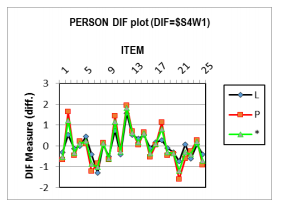Main Article Content
Abstract
This study aims to (1) perform theoretical construct testing on students' resilience inventory and (2) measuring student's resilience based on gender. This study used a survey method with a sample of 40 high school students in Bandung. Data analysis used the RASCH model. These research findings show (1) inventory resilience has been fit with the theoretic model, and (2) female student has a tendency to a higher resilience rather than the male student. Furthermore, the measurement of student's resilience by using this inventory can only produce high measurement information for students who have the intermediate ability. So, the researcher needs to consider eliminating item No. 18 in this inventory due to the biased towards the female gender.
Keywords
Article Details

This work is licensed under a Creative Commons Attribution-ShareAlike 4.0 International License.
References
- Amelia, S., Asni, E., & Chairilsyah, D. (2014). Gambaran ketangguhan diri (resiliensi) pada mahasiswa tahun pertama fakultas kedokteran universitas riau. Riau University.
- Andriani, A., & Listiyandini, R. A. (2017). Peran Kecerdasan Sosial terhadap Resiliensi pada Mahasiswa Tingkat Awal. Psympathic : Jurnal Ilmiah Psikologi, 4(1), 67–90. https://doi.org/10.15575/psy.v4i1.1261
- Bonanno, G. A., Galea, S., Bucciarelli, A., & Vlahov, D. (2007). What Predicts Psychological Resilience After Disaster? The Role of Demographics, Resources, and Life Stress. Journal of Consulting and Clinical Psychology, 75(5), 671–682. https://doi.org/10.1037/0022-006X.75.5.671
- Bond, T., Yan, Z., & Heene, M. (2015). Applying the Rasch model: Fundamental measurement in the human sciences. Routledge.
- Brougham, R. R., Zail, C. M., Mendoza, C. M., & Miller, J. R. (2009). Stress, sex differences, and coping strategies among college students. Current Psychology, 28(2), 85–97.
- Chemers, M. M., Hu, L., & Garcia, B. F. (2001). Academic self-efficacy and first year college student performance and adjustment. Journal of Educational Psychology, 93(1), 55.
- Chen, S., & Bonanno, G. A. (2020). Psychological Adjustment During the Global Outbreak of COVID-19: A Resilience Perspective. Psychological Trauma: Theory, Research, Practice, and Policy, 12, 51–54. https://doi.org/10.1037/tra0000685
- Connor, K. M., & Davidson, J. R. T. (2003). Development of a new Resilience scale: The Connor-Davidson Resilience scale (CD-RISC). Depression and Anxiety, 18(2), 76–82. https://doi.org/10.1002/da.10113
- Hamilton, S., & Fagot, B. I. (1988). Chronic stress and coping styles: A comparison of male and female undergraduates. Journal of Personality and Social Psychology, 55(5), 819.
- Hendriani, W. (2018). Resiliensi psikologis: sebuah pengantar. Kencana.
- Kemendikbud. (2020). Surat Edaran Nomor 3 Tahun 2O2O Tentang Pencegahan Corona Virus Disase (COVID-19) Pada Satuan Pendidikan.
- Kumar, N., & Quisumbing, A. (2014). Gender and resilience. Resilience for Food and Nutrition Security, Ed. S. Fan, R. Pandya-Lorch, and S. Yosef, 155–168.
- Latif, S., & Amirullah, M. (2020). Students ’ Academic Resilience Profiles based on Gender and Cohort. 5(4), 175–182. https://doi.org/10.17977/um001v5i42020p175
- Linacre, J. (1994). Sample size and item calibration stability. Rasch Mes Trans., 7, 328.
- Maesaroh, S., Sunarti, E., & Muflikhati, I. (2019). Ancaman, Faktor Protektif, dan Resiliensi Remaja di Kota Bogor. Jurnal Ilmu Keluarga Dan Konsumen, 12(1), 63–74. https://doi.org/10.24156/jikk.2019.12.1.63
- Mahardika, A. K. (2017). Perbedaan Resiliensi Ditinjau Dari Jenis Kelamin Pada Remaja Dengan Orang Tua Yang Bercerai. Fakultas Pendidikan Psikologi UM, 1–15. http://fppsi.um.ac.id/wp-content/uploads/2020/04/PERBEDAAN-RESILIENSI-DITINJAU-DARI-JENIS-KELAMIN-PADA-REMAJA-DENGAN-ORANG-TUA-YANG-BERCERAI.pdf
- Pragholapati, A. (2020). Resiliensi Pada Kondisi Wabah Covid-19. 1–9. https://doi.org/10.35542/osf.io/3r8jk
- Purwanto, A. (2020). dkk.“. Studi Eksploratif Dampak Pandemi COVID-19 Terhadap Proses Pembelajaran Online Di Sekolah Dasar.†EduPsyCouns, 2(1).
- Reivich, K., & Shatté, A. (2002). The resilience factor: 7 essential skills for overcoming life’s inevitable obstacles. Broadway books.
- Rinaldi, R. (2011). Resiliensi pada masyarakat kota padang ditinjau dari jenis kelamin. Jurnal Psikologi, 3(2).
- Rizkiana, D. (2020). Resiliensi Akademik Mahasiswa Jurusan Bimbingan Konseling Islam (Bki) Iain Tulungagung Yang Sedang Menempuh Skripsi Di Tengah Wabah Covid-19 Ditinjau Dari Jenis Kelamin. http://repo.iain-tulungagung.ac.id/17866/
- Sarwar, M., Inamullah, H., Khan, N., & Anwar, N. (2010). Resilience And Academic Achievement Of Male And Female Secondary Level Students In Pakistan. Journal of College Teaching & Learning (TLC), 7(8), 19–24. https://doi.org/10.19030/tlc.v7i8.140
- Somchit, S., & Sriyaporn, P. (2004). The relationships among resilience factors, perception of adversities, negative behavior, and academic achievement of 4th- to 6th-grade children in Thad-Thong, Chonburi, Thailand. Journal of Pediatric Nursing, 19(4), 294–303. https://doi.org/10.1016/j.pedn.2004.02.004
- Sumintono, B., & Widhiarso, W. (2014). Aplikasi model Rasch untuk penelitian ilmu-ilmu sosial (edisi revisi). Trim Komunikata Publishing House.
- Trisnadewi, K., & Muliani, N. M. (2020). Pembelajaran Daring di Masa Pandemi Covid-19. COVID-19: Perspektif Pendidikan, 35.
- Wahyudi, S., & Asyanti, S. (2020). Resiliensi Karyawan Pabrik Ditengah Pandemi Coronavirus Diseases (Covid-19) Ditinjau dari Jenis Kelamin dan Status Karyawan. http://eprints.ums.ac.id/id/eprint/86299

